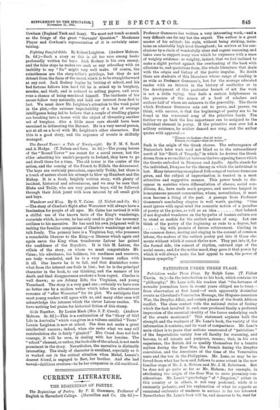C URRENT LITERAT (IRE.
THE BEGINNINGS OF POETRY.
The Beginnings of Poetry. By F. B: Gummere, Professor d English in Haverford College. (Macmillan and Co. 12s. 6d.)— Professor Gummere has written a very interesting work,—and a very difficult one for any but the expert. The author is a great master of his subject: his style, without being striking, main- tains an admirably high level throughout; he arrives at his con- clusions by a chain of wonderfully clear and cogent reasoning, and takes care to support every view which he expresses with a mass of weighty evidence: so weighty, indeed, that we feel inclined to make a slight protest against the overloading of the book with allusions to, and quotations from, the whole literature that deals with the origin and history of the poetic impulse. No doubt there are students of this literature whose range of reading is as wide as Professor Gummere's, but for the average educated reader with an interest in the history of aesthetics or in the development of this particular branch of art the work is not a little trying. One feels a certain helplessness in the presence of the names of a host of scholars and authors half of whom are unknown to the generality. The thesis which Professor Gummere sets out to prove, and proves, we think, with success, is that the beginnings of poetry are to be found in the communal song of the primitive horde. The further we go back the less importance can be assigned to the individual element in poetry. If the primitive man ever led a solitary existence, he neither danced nor sang, and the author quotes with approval :—
" Einsam zu denken—das ist weise
Einsam zit singen—dass it darnel."
Such is the origin of the Greek chorus. The extravagance of Nietzsche's later work need not blind us to the extraordinary merit of his "Birth of Tragedy," in which he derives the Greek drama from a reconciliation between the two opposing forces which the Greeks embodied in Dionysos and Apollo. Apollo stands for the individual, Dionysos for the throng in which the individual is loot. Many interesting examples of folk-songs of various forms are given, and the subject of improvisation is treated in a most attractive and suggestive manner. This power tends to dis- appear in societies where differentiation of classes, social con- ditions, lee., have made much progress, and survives longest in homogeneous peasant communities, where, nevertheless, it must soon become a thing of the past. A passage from Professor Gummere's concluding chapter is well worth quoting. "One must ignore with equal mind the romantic notion of a paradise
of poetry at the prime, as well as an idea that belated if not degraded wanderers on the by-paths of human culture are to stand as models for the earliest makers of song. Let one think of the poetry of the beginning as rude to a degree, but big with promise of future achievement. Circling in the common dance, moving and singing in the consent of common labour, the makers of the earliest poetry put into it those ele- ments without which it cannot thrive now. They put into it, for the formal side, the consent of rhythm, outward sign of the social sense ; and, for the nobler mood, they gave it that power by which it will always make the last appeal to man, the power of human sympathy."


























































 Previous page
Previous page